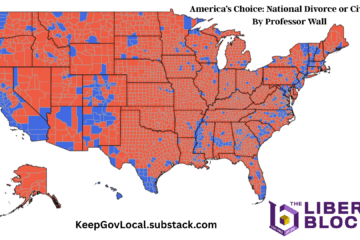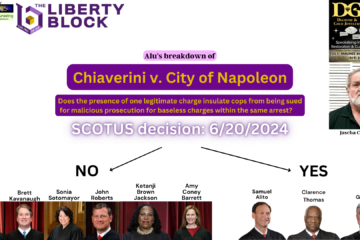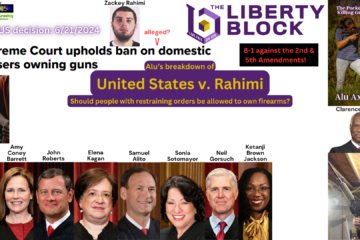This article was first published at connerdrigotas.com
Tim Silfies was one of the highest quality individuals the Libertarian Party has ever put forward as a congressional candidate. He ran for Pennsylvania’s 7th Congressional District as a born and raised local with national media experience. He demonstrated a strong understanding of the district and invested a full time commitment to winning. He quit his job as a business reporter to run his race.
In the end, however, Tim earned only 3.1% of the vote. Not even enough to cover the margin of victory.

I am an ardent defender of freedom and liberty for all people, a self described (l)ibertarian, and I have not seen exceptional candidates in the Republican and Democratic parties who are working to expand our liberties as Americans. I volunteer on Libertarian campaigns, donate money, and constantly work to advance liberty in all aspects of my life.
I know I am not alone in having concerns about the state of liberty in America but, as a pragmatic libertarian, I also have concerns about a Libertarian’s ability to win public office at the state and federal level.
The biggest red flag for me in this case was not the final vote percentage, so much as the surrounding facts. Libertarians love to point to debate exclusion, poll exclusion, and lack of media coverage as reasons why candidates fare poorly.
Tim received media coverage. He was part of the media, a business reporter on WFMZ and a former Fox News Producer in New York City, until he left his position to run this race. As a candidate, he appeared on Fox Business on Kennedy, twice. He was included in every debate. He performed incredibly well in each debate, routinely winning with his specific policy recommendations and emotional appeals. Tim was mentioned in every local article that discussed the race and he garnered an appropriately large social media following.
He raised and spent money as well. Despite having less cash, his cost per vote was lower than the victor.
But when people got to the polls, they still voted for the lesser of two evils, candidates that they themselves (by all media and polling accounts) believed to be inadequate leaders. They did not vote based on principle, they voted out of fear about the other major parties candidate.
To hear Tim tell it: “They said, I love your message. I love your ideas. I wish I could vote for you.”
That is a concerning narrative in my hometown.
What is working?
Meanwhile, groups like Operation Win at the Door, led by Cliff Malony Jr. of Young American’s for Liberty — supported almost exclusively liberty leaning Republicans in state level races across the country. Their organization knocked on more than 1,000,000 doors and changed the hearts and minds of many. They elected 37 “liberty minded” people to public office. They came closer to their goal of increasing liberty in government by co-opting the system and making sure that liberty minded individuals were getting additional support on the ground.
Principles above politics. I have always said that is the gold standard for judging a candidate — and I believe it is time that we examine political parties the same way. Where the Libertarian Party is principled, the organization is not yet penetrating the market enough to get people elected. The value proposition isn’t strong enough. Based on the example of Tim Silfies, I am worried that the Libertarian party will never become an effective voice for liberty minded Americans. When Libertarian candidates are able to overcome the typical barriers, as Tim did, they are still getting crushed at the ballot box by a polarized system based on fear.
Maybe some of it can be explained by money. While Tim spent less per vote — he didn’t have enough money to reach enough voters. The gap is significant. Perhaps those numbers could be spun to either side of the debate.
I am more inclined to believe there is a systemic issue. Nationally, Libertarian Party leadership is stagnant and not creative. There was little if any support from a national infrastructure to aid Tim’s campaign, and even at the state level there was only limited mobilization. I understand the Libertarian idea of decentralization, but if you choose to play politics — do it in such a way that you are competitive.
There are no major media pushes from national leadership. They are slow to respond, and they constantly delegate routine campaign responsibilities to state organizations. Ironically, they are creating greater bureaucracy by doing so. Efforts by 50 state organizations are redundant and campaigns routinely start from scratch at the beginning of every cycle. Local and state leaders are overwhelmed and under-trained to be effective political organizers. They are starving for more education, and don’t always know where to go to receive it. The national organization is not prioritizing training and empowerment, which is what would be necessary for local success.
I believe Libertarians stand to gain the most by focusing all of their efforts on local politics, and ensuring that liberty is preserved in our states. The Tenth Amendment still has teeth — even if it is underutilized.
The Two Party System
On January 28, 2019 I sat at CPAC in Washington DC and listened to Brad Parscale talk about the 2020 election. He is the Campaign Manager for Donald J. Trump’s 2020 reelection bid. There were 614 days until November 3, 2020 and he had 1.3 million active volunteers. As he put it, “I have 1 volunteer for every 13 people the campaign needs to reach.” The Libertarian Party has 500,000 total registered voters and will not even select a presidential candidate until May 25, 2020 — with only 162 days to go before the election.
That should be the homestretch, not the kickoff. Smaller parties need more time to organize, not less. Where the Libertarian Party has a continuity problem, the Republican Party has a continuity machine that is devouring our country. The Democratic Party has a similar machine that rolls forward: 24 hours a day, 7 days a week, 365 days a year. It is the way the Libertarian Party has organized that creates the biggest barriers to it being effective.
The Republican Party is getting people elected who may or may not be liberty minded. Most often they miss the mark on social issues, where they should be promoting small government and more individual freedom. The Republican Party has failed as an institution to shrink government, though I believe many individuals in the party at many levels work every day to accomplish that goal. The Democratic Party is helping elect candidates who are not liberty minded, and are struggling to maintain social tolerance as part of their core principles. Their fiscal policy is ruinous. In other words, there is a market opportunity there, but the Libertarians need to fill that void competently.
The Third Party
I sat at the Libertarian Party of Pennsylvania (LPPA) Convention on March 16, 2019. From an active membership of just over 200, there were 62 people in attendance. There is a tremendous amount of credit to be given. The multi-day event featured presidential candidates, state candidates, local candidates, vendors, and an exchange of ideas that focused on where change can actually be made — in our communities. In Pennsylvania, there is a renewed focus on action oriented leadership.
A consistent highlight of the Libertarian movement is Larry Sharpe, who also spoke to the LPPA at this convention. His talk focused on grassroots action and his approach to increasing liberty: “smile politely, be friendly, and keep having conversations.”
He believes that even when people come to the Libertarian Party looking for “Democrat-lite or Republican-lite,” they should be welcomed with open arms. “Don’t berate beliefs that are anti-liberty. Embrace what is pro-liberty, and keep having conversations.” By doing that, he claims, people will return again and again — and liberty will grow.
I am curious to learn whether my fellow liberty lovers have thoughts on the case study of Tim Silfies, and the current electoral reality across the country? Can liberty be advanced through the Libertarian party at the state or national level? What comes next to fill that void in a rapidly polarizing system? How can liberty be advanced in these United States?
Can Americans elect a Libertarian?
Only 17% of people pay attention to politics. Despite the best media coverage, debate inclusion, and money spent- 16% of people show up to vote without paying attention. They vote on party lines without, perhaps, understanding what that means. Only 55% of people bother to vote at all.
I have a number of ideas about what should come next, both for the Libertarian party and libertarians. The goals need to be bigger. The tent needs to be bigger. The plans need to be more specific, action oriented, and local. Keep an eye out for more articles on this, and the launch of some important projects. Follow me here to stay in the loop.
In the meantime, I am looking for recommendations on the best way to promote liberty and individual freedoms in these United States of America for the protection and advancement of all people. What ideas do you have for me? Comment here, or send me a message on facebook.
So long as more power is consolidated in Washington — the ranks of those who will fight for liberty will continue to grow. The question is whether those numbers will be large enough to make a difference, before it is too late.


